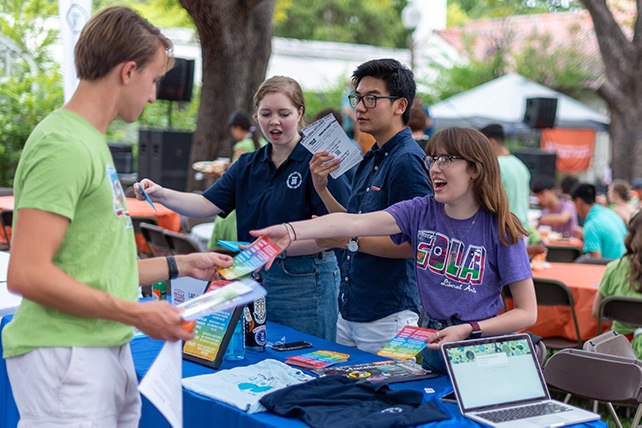Teaching in Plan II
The Plan II Honors Program is seeking faculty from all disciplines and all colleges to teach exceptionally bright and motivated students with a wide variety of interests.
Plan II conducts an annual call for new course proposals and proposal review during the spring semester of each academic year, early submissions are welcome and may be reviewed earlier depending on curriculum needs. Each course proposal and the submitters teaching evaluations are reviewed by the Plan II Advisory Council which consists of veteran Plan II teaching faculty and representatives from the current student body. The group provides feedback to each instructor who submits a proposal. If a proposal is accepted, Plan II administrators will work with the instructor regarding the next logistical steps to schedule the course. Faculty who are new to Plan II are strongly encouraged to get in contact with the Plan II Office in advance of the proposal deadline to discuss their ideas.
PROPOSAL SUBMISSION
The Spring 2025 Call for Course Proposals is now open, with a deadline of Monday, March 24 at 5 p.m. All course proposal materials should be emailed directly to Anne McCreary.
The Plan II Honors Program accepts new course proposals year round. All new proposals are reviewed by the Plan II Faculty Advisory Council each spring and proposals received before the March 24, 2025 deadline will be considered during this spring's meeting, held in late April.

What is Plan II?
Plan II is a challenging interdisciplinary undergraduate honors program leading to a Bachelor of Arts degree. With more than 75 years of success, it differs from most honors programs in that its core curriculum is itself a major. The major curriculum includes humanities, social sciences, and natural sciences, resulting in a fine general education. In the end, our students' research and writing skills are put to the test in an exacting senior thesis requirement. Plan II students have wide interest in and voracious appetites for learning. More than half of the 700+ Plan II students are simultaneously completing other majors or even second degrees in other colleges. They have been selected to be in the Plan II Honors Program through a rigorous admissions process.
Plan II courses are kept small to foster a learning environment of the highest quality and strong sense of community among students and faculty.
Plan II welcomes course proposals in the following categories:
Plan II First-Year Signature Course (T C 302), 15 - 18 students
These are small seminar courses that emphasize discussion, critical thinking, short research projects, student presentations, and writing on interdisciplinary topics of contemporary importance. Recent seminar topics include "Pathways to Civic Engagement," "Mexico City: Aztec and Modern," "The Social Body Network: Race, Gender, and the Ethics of Science and Technology," and "Hunger." All Plan II freshmen take a First-Year Signature Course, either in the fall or spring. The School of Undergraduate Studies (UGS) requires all First-Year Signature courses to include several course essentials and be designated with the writing flag. Signature courses may be taught by tenured and tenure-track professors, as well as senior lecturers. Funding provided by UGS for signature courses goes to the professor’s home department and not to Plan II.
Junior Seminar (T C 358), 15 - 18 students
The Plan II junior seminar requirement is designed with two purposes: to allow our students to explore topics from different academic areas at an advanced level, and to train them in the research methodologies and writing skills needed for their required senior thesis. These are small seminar courses that emphasize discussion, critical thinking, research, student presentations, and writing. Recent seminar topics include "Myths of War and Violence," "Apocalyptic Narratives," "Genomes and Evolution," and "The Law and Ethics of Climate Change." Plan II students take two seminars in the junior year.
Honors Social Science (SS 302), 30 - 50 students
This one-semester course, often taken in the second or third year, introduces students to contemporary social issues & the methods and materials of social science, usually from the perspective of one discipline. Recent offerings include economics, anthropology, and psychology.
Modes of Reasoning (T C 310), 20 - 40 students
This is a rubric for courses introducing students to formal structures for quantitative reasoning: computer science, game theory, operations research, or statistics and probability. Topics can vary and have included courses on the use of statistics in science or social science and research methods across academic disciplines. The course is typically taken during the freshman year.
